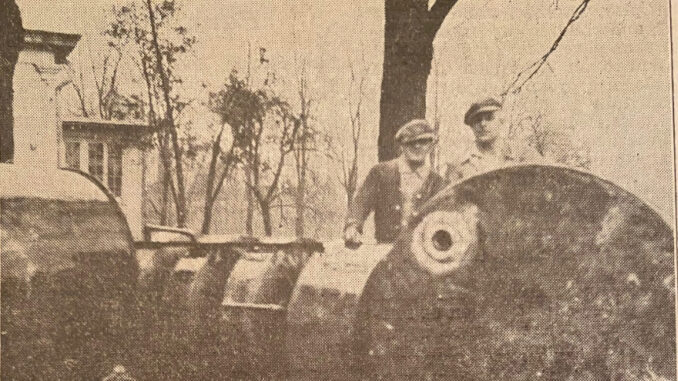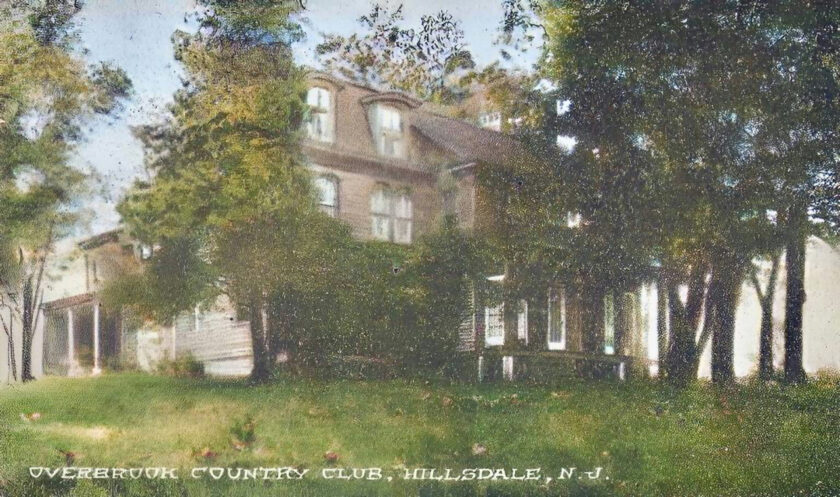
HILLSDALE—“Two 300-gallon stills, hundreds of barrels and bottles, and all the paraphernalia necessary to conduct a huge distillery, were uncovered last Friday in a raid on the former Overbrook Country Club on Westwood Avenue. A complete plant was in evidence, and while no mash or liquor was found, the elaborately equipped plant was in readiness to begin operations,” the Hillsdale Herald reported in April of 1926.
It was the biggest distillery that had ever been discovered in the vicinity, but by no means was it the only one. In those days, newspaper headlines would regularly report that another Pascack Valley barn had been raided and a bootlegger operation had been disbanded.
Those were the days of Prohibition, when the sale of alcohol was illegal across America. Of course, people’s taste for drink, and their willingness to pay for it, persisted despite what the law said. Illicit distilleries of all sizes were set up in the rural outskirts of Pascack Valley towns during the Roaring Twenties, using derelict barns and vacant farmhouses as cover.
Stories of bootleggers in the Pascack Valley are plentiful.
A crew shot up the house of Woodcliff Lake farmer Herman Tice in 1929, when they thought he ratted them out to the police. In 1930, prosecutors dumped 37,000 gallons of mash liquor into the Pascack Brook when they raided a huge distillery in a barn on Grand Avenue in Park Ridge. In 1931, police broke up a distillery that was sharing a barn with a herd of cows on Rivervale Road in River Vale. That operation had enough equipment to put out 60 barrels a day. Tony D’Agostino, one of northern New Jersey’s foremost rum barons, ran an operation from an old barn on Chestnut Ridge Road in Montvale.
There are enough accounts of Pascack Valley bootlegging and speakeasies to fill a book, and certainly there are more we do not know about. The most successful operations flew under the radar and were never discovered.
When police raided the former Overbrook Country Club in April of 1926, they discovered a massive distillery just about to begin operation. It was a prime location for bootlegging, located on the outskirts of town in a house that had been vacant for several years. It was an unfortunate ending for a nearly 150-year-old home that had once been a focal point of the community.

The Overbrook Country Club was on the Pascack Brook where Westwood Avenue in Westwood meets Demarest Avenue in Hillsdale. The historical roots of this property ran deep.
In the 1780s Garret Demarest established a mill here and built a small bridge over the Pascack Brook, thus bringing about the region’s colloquial name, “Overbrook.”
In his lifetime Demarest expanded his business to include both a saw mill and grist mill (where area residents would bring their grain to have it ground into flour), as well as a general store. With his bridge being the only spot to cross the Pascack Brook for miles, Demarest was well situated and did a good business.
The old mill was in ruins by the start of the 20th century, but the Demarest homestead, which stood southwest of the mill, in later years was enlarged and remodeled in a Victorian style. In 1915 it became the clubhouse of the newly established Overbrook Country Club.
Although the country club is long gone from the landscape, a century ago it was a focal point of social life in the area. With dues set at 50 cents a month, the club had plenty to offer those who enjoyed being active. There was swimming, boating, a bowling alley, a baseball team, tennis matches, track meets, pageants, a dance hall, skeet shooting, and more. Public celebrations attracted thousands of people at a time.
A series of setbacks saw business dwindle before the Overbrook Country Club closed entirely. By 1926, the old Demarest house, the former clubhouse, was sitting vacant. Then came the bootleggers.
At the back of the large, rambling structure, detectives found two 150-gallon stills, two complete steam plants, and some 200 mash barrels. The stills were elaborate contraptions reaching into the second story of the building. Holes had been cut in the ceiling to accommodate them. In the basement, cartons of pint bottles were stacked against the walls.
County police dismantled all of the equipment and took it back to Hackensack. The bootleggers, perhaps tipped off to the impending raid, had fled.
“The raid is believed to be the result of the known presence in this vicinity of several reputed bootleggers,” the Hillsdale Herald reported. “The Prosecutors’ men, after a few days of watching, decided that operations were about to begin in this vicinity, and by process of elimination picked out the Overbrook house.”
In 1931, the house, still deserted, was burned down in an act of arson. There was no connection between the arsonists and the bootleggers.
